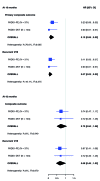Six months versus two years of oral anticoagulation after a first episode of unprovoked deep-vein thrombosis. The PADIS-DVT randomized clinical trial
- PMID: 30606789
- PMCID: PMC6601089
- DOI: 10.3324/haematol.2018.210971
Six months versus two years of oral anticoagulation after a first episode of unprovoked deep-vein thrombosis. The PADIS-DVT randomized clinical trial
Abstract
The optimal duration of anticoagulation after a first episode of unprovoked deep-vein thrombosis is uncertain. We aimed to assess the benefits and risks of an additional 18 months of treatment with warfarin versus placebo, after an initial 6 months of anticoagulation for a first unprovoked proximal deep-vein thrombosis. We conducted a multicenter, randomized, double-blind, controlled trial comparing an additional 18 months of warfarin with placebo in patients with a unprovoked proximal deep-vein thrombosis initially treated for 6 months (treatment period: 18 months; follow up after treatment period: 24 months). The primary outcome was the composite of recurrent venous thromboembolism or major bleeding at 18 months. Secondary outcomes were the composite at 42 months, as well as each component of the composite, and death unrelated to pulmonary embolism or major bleeding, at 18 and 42 months. All outcomes were centrally adjudicated. A total of 104 patients, enrolled between July 2007 and October 2013 were analyzed on an intention-to-treat basis; no patient was lost to follow-up. During the 18-month treatment period, the primary outcome occurred in none of the 50 patients in the warfarin group and in 16 out of 54 patients (cumulative risk, 29.6%) in the placebo group (hazard ratio, 0.03; 95% confidence interval: 0.01 to 0.09; P<0.001). During the entire 42-month study period, the composite outcome occurred in 14 patients (cumulative risk, 36.8%) in the warfarin group and 17 patients (cumulative risk, 31.5%) in the placebo group (hazard ratio, 0.72; 95% confidence interval: 0.35-1.46). In conclusion, after a first unprovoked proximal deep-vein thrombosis initially treated for 6 months, an additional 18 months of warfarin therapy reduced the composite of recurrent venous thrombosis and major bleeding compared to placebo. However, this benefit was not maintained after stopping anticoagulation. Clinical registration: this trial was registered at www.clinicaltrials.gov as #NCT00740493.
Copyright© 2019 Ferrata Storti Foundation.
Figures



References
-
- Research Committee of the British Thoracic Society. Optimum duration of anticoagulation for deep-vein thrombosis and pulmonary embolism. Lancet. 1992;340(8824): 873–876. - PubMed
-
- Levine MN, Hirsh J, Gent M, et al. Optimal duration of oral anticoagulant therapy: a randomized trial comparing four weeks with three months of warfarin in patients with proximal deep-vein thrombosis. Thromb Haemost. 1995;74(2):606–611. - PubMed
-
- Schulman S, Rhedin A-S, Lindmarker P, et al. A comparison of six weeks with six months of oral anticoagulant therapy after a first episode of venous thromboembolism. Duration of Anticoagulation Trial Study Group. N Engl J Med. 1995;332(25):1661–1665. - PubMed
-
- Kearon C, Gent M, Hirsh J, et al. A comparison of three months of anticoagulation with extended anticoagulation for a first episode of idiopathic venous thromboembolism. N Engl J Med. 1999;340(12):901-907. Erratum in: N Engl J Med. 1999;341(4):298. - PubMed
-
- Agnelli G, Prandoni P, Santamaria MG, et al. Warfarin Optimal Duration Italian Trial Investigators. Three months versus one year of oral anticoagulant therapy for idiopathic deep venous thrombosis. Warfarin Optimal Duration Italian Trial Investigators. N Engl J Med. 2001;345(3):165–169. - PubMed
Publication types
MeSH terms
Substances
Associated data
LinkOut - more resources
Full Text Sources
Medical

